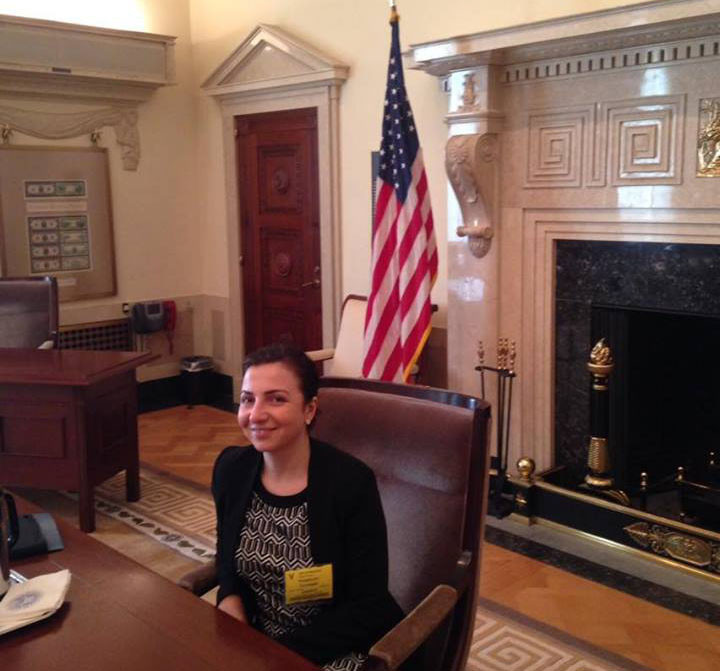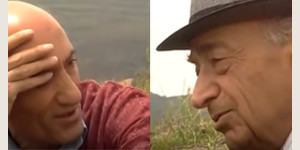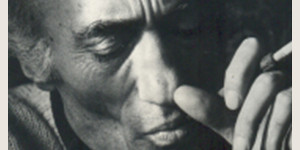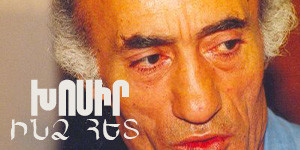THE LIGHTS OF ARMENIA. Pertshuhi Torosyan

Արշալույսը
լրագրող է:
Բնույթով՝
մաքսիմալիստ:
Համոզված է,
որ լավ
գիտելիքից,
ձևավորված
արժեքային
համակարգից
և որակյալ
մասնագետ
լինելուց բացի,
կարևոր են
նաև
միջավայրերը:
Այդտեղ է,
որ մարդն
անընդհատ
ձևավորվում և
ձևավորվում է:
Առավել չի
հանդուրժում
անարդարությունը:
Նաև՝
մեծամտությունը:
Անհաշտ է
բոլոր
տեսակի
կարծատիպերի
հետ:
“ The Armenians” panarmenian mediaspace outlet starts exclusive project - “ THE LIGHTS OF ARMENIA.” We are going to tell about “ Luys” Foundation Scholars - Global top ten university graduates who have created a unique Armenian world. Following our perspective we aim to unite the whole creative intellect of professionals from Armenia and throughout the World. By that unity we can “ Change and Be Changed”, which is our slogan. We are sure that the biggest investment is the investment in people.
Pertshuhi Torosyan: United Strength as a Basis of Change
- What makes you give an interview to an unfamiliar Armenian journalist?
- Nowadays’ reality is that many Armenians do not live in Armenia. One of the means to save identity is to keep that connection. The Armenian World is created for me by this.
USA – Armenia - USA, or “ the reality of a no-place affiliation”
Pertshuhi Torosyan is an economic policy and financial analyst. She is a graduate of University of Iowa, Brandeis University and Columbia University. Born in Hrazdan city she later moved to Yerevan, then to the USA, where she lives and works now.
In the 90s Pertshuhi’s mother was enhanced opportunity to complete an internship in the USA in the field of journalism. Later she had the opportunity to complete her Masters Degree and Ph.D. in the United States and work for radio. Later on the family reunited in the U.S.
Pertshuhi describes her parents as liberal and extraordinary people: “ During those years (90s), when it was hard for the people to earn their livings, my parents had many ambitions. My mother came to the U.S. and received her education when she was in her late 30s and already had two children. My father helped her a lot, pushed her, and he also had significant achievements. They overcame many difficulties – the barriers of a new language, culture. After all this, without their prompt we understood that ambitions are essential.”
Now Pertshuhi’s mother is an Associate Professor and Chair at the Department of Communication Arts at State University of New York, while her father heads a pharmaceutical quality-control laboratory in upstate New York.
Education, or “ knowledge should be demanded, not given”
Pertshuhi received a part of her education in Armenia, the other in the U.S. As initially she didn’t manage to get used to living in the U.S., the decision was made to return to Armenia, settle there and continue her education here. Pertshuhi entered The French University in Armenia while she was a senior in high school. While there she experienced the contrast of realities between high school and university with apprehension.
Pertshuhi considers that during university education, unlike primary education knowledge should be more demanded than given. She notices the lack of this reality in Armenia, where other approaches to education are often not fostered. There was another problem of values that disturbed her - students’ attention was more focused on relationships than on education.
These problems need to be solved fundamentally, as education is one of the core components of long term economic prosperityand it needs appropriate attention: “In most cases it was a shame for boys to study hard, or it was not accepted for girls to have their own opinion and to talk a little bit more. This was what I experienced in Armenia. Those stereotypes were significant barriers for learning.”
Apart from education, some other steps should be undertaken to stimulate economic progress, but Pertshuhi didn’t want to go into details: “It is wrong for me to give advice without living there. It would be naive of me to express my opinion without exploring and understanding the problem. I know many theories, but Armenia is in a tough political and economic state. From my standpoint it’s not that easy to suggest solutions.”
Specialization, or “Օne needs to get a Ph.D. in the U.S., in order to be called an economist”
Pertshuhi made her choice of a specialization among different options. “I had a wide range of interests, like mathematics, psychology, philosophy, etc..Economics combines fine arts and natural sciences, thus I chose it.” She explains that the goal of economics as it is the case for many other professions is to make a positive impact on people’s lives. Money and the economy is the engine of human existence and daily life.
Pertshuhi’s professional interest is in the study of economic growth and development in emerging markets. She works at the Federal Reserve Bank of New York where she conducts global economic and financial markets analysis. She states that in the U.S. one needs to get a Ph.D. in order to be called an economist. She doesn’t have that degree, but also doesn’t intend to pursue it.
Her educational background starts from The University of Iowa, where she majored in Economics and International Studies. She received graduate training in International Economics and Finance from Brandeis University. The second Master’s Degree she received from Columbia University specializing in Economic Policy Management. “I’ve chosen this field in order to get practical education and to be close to economics. I already had a Master's Degree and the second one, I thought, should be such that it adds measurable value.”
While choosing a university Pertshuhi prioritized it being among the best in the selected field of study. Initially, she hesitated in applying to Columbia University and other highly regarded institutions as she was unsure of her abilities and afraid of not being accepted. After maturing a little bit more she understood that most of things in life are the results of hardwork. The final determination to apply to Columbia Universitywas made with her husband’s help.
Together with studying at the university Pertshuhi constantly worked and not always in the field of her profession. She has the experience of working in public diplomacy in Washington DC, during which she learnt many things from key political and business representatives from various nations. While studying at Brandeis, she joined the World Bank Group as a short-term consultant and after graduation she continued to work in the field of intentional development. Pertshuhi also worked in the Asset Management industry in the New York City as an Internal Management Consultant, during which time she gained valuable insight into financial markets and operations.
Pertshuhi is sure that work compliments education and gives a sense of independence, teaches work ethic, and gives skills that are essential in work but not necessarily taught at school.
Interests, or “discovering the limits to physical and mental capacity”
Pertshuhi values personal relationships: “I have a large human network. Some of them are my childhood friends from Yerevan, others are my university friends, acquaintances from all the US cities where I lived. There are different kinds of people in my network. There is always need in my mind to unite them. Perhaps it is also for myself, in order not to have such a separated life.”
Now Pertshuhi lives in New York City - a big and interesting place, where the hustle and the bustle of the city is tedious. For her the solution is nature. She goes to expeditions with her husband, especially in the winter, when there are fewer people in the mountains. Pertshuhi also has another lifestyle - for more than 15 years she has practiced yoga, through which she discovers the limits of her physical and psychological capacity.
She also likes classical music. Now she mostly prefers to listen to it, rather than play herself. She tells that classical music helps her to organize her thoughts. As it refers to literature, she is interested in books on evolution and on how the human brain operates. Currently, Pertshuhi compliments what she has missed during school years, she has started to read the History of Armenia: “PavstosBusand’s book is now lying in front of me, it interests me a lot.”
The Future, identity and Armenia, or “if everyone does what he/she could”
During the first period of her living in the U.S., Pertshuhi wanted to come back to Armenia. Now she has the same idea, but also has some concerns about career development here. There are many improvements in Armenia, but people who are competitive on a global scale gather in the U.S. This competition motivates an individual to constantly improve: “The worst thing for me is to think that I am a high-level professional at my young age, to think that I have already accomplished a lot and be satisfied with that. I see that danger for me now as it is an impediment to constant growth and exploration.”
Pertshuhi is ready to provide her time, energy and other means if needed for others. For now she doesn’t have big plans for helping Armenia. She does not consider this period of her life the time when she could bring change to Armenia. To do that she needs to achieve many things and mature much more, but: “My guess is there are a very few people who can bring major change on their own. If each of us does what he/she can and be open to opportunities, then united power can change something.”
Pertshuhi and her husband are graduates of Columbia University where they both majored in Public Policy. Her husband moved to the U.S. 6 years ago. They have a lot of similar interests and a mutual understanding in many aspects of life: “When you grow up in some place and live in another one, you have a sense that you nether belong in the first, nor the second one. You get cut off from your old habitat, changed, but you don’t integrate fully with the new one and you become a person “in the middle”. My husband is Armenian, who was born in Armenia and lives here, he can understand that.”
Pertshuhi tells from her experience that a person finds his/her identity through comparison. While living in Armenia she didn’t realized that her identity is defined by her being Armenian. There is a widely discussed topic that worries her. Armenians living in the diaspora often give advice, often opining on what is right or wrong for Armenia. She agrees that it is not necessarily pleasant to hear this for those Armenians living in their homeland, nevertheless there is an explanation: “It is the result of compassion and fear for your country, our identity. God forbid if something goes wrong in Armenia, each of us will loose a great part of ourselves. I would advise not to take it too critically, but rather think that this is what connects us and that it is an integral part of us.”
Արշալույս Բարսեղյան

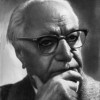




 Partly cloudy
Partly cloudy 
